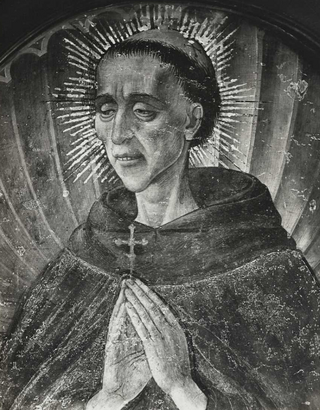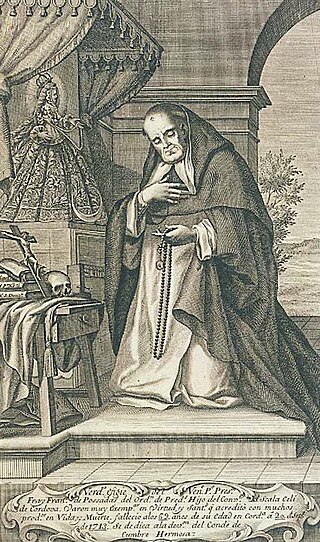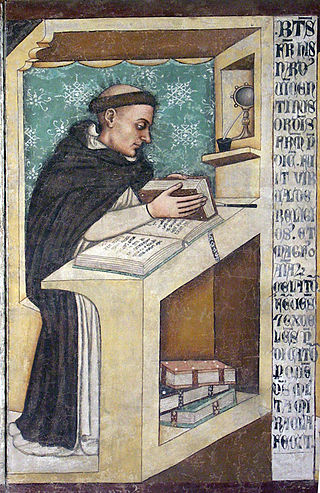
Stanisław Kazimierczyk was a Polish Catholic priest and a professed member of the Canons Regular of the Lateran. He became noted for his ardent devotions to both the Eucharist and to his personal patron saint, Stanislaus of Szczepanów, as well as for his charitable dedication to the ill and poor of Kraków.

Augustin Kažotić was a Croatian prelate of the Catholic Church and professed member from the Order of Preachers who served as the Bishop of Lucera from 1322 until his death. Kažotić was a humanist and orator who had served first as the Bishop of Zagreb from 1303 until 1322. Kažotić studied in Paris before returning to his homeland where he began working in the missions and preaching in modern Bosnia. He was one of the first humanist figures to appear in southern Croatia.

Pio Alberto del Corona - born Alberto del Corona and in religious Pio - was a Roman Catholic Italian prelate and the founder of the Suore Domenicane dello Spirito Santo. He served as the Bishop of San Miniato from 1897 until his resignation one decade later. The bishop served as a humble pastor though reluctant as he was to accept his episcopal appointment while even protesting against an idea to elevate him into the cardinalate. He exercised his duties until ill health forced him to resign from his see though was given a ceremonial position since Pope Pius X did not wish to relieve him of all his episcopal duties and functions.

Jakub Strzemię was a Polish Roman Catholic archbishop and a professed member of the Order of Friars Minor. He served as the Archbishop of Halicz from 1392 until his death when the archdiocese was incorporated into that of the Archdiocese of Lviv.

Blessed Ladislas of Gielniów was a Polish Roman Catholic priest and a professed member of the Order of Friars Minor. He was an observant of the Rule of Saint Francis of Assisi and served his order in various capacities that included both a doorkeeper and as its provincial. He also travelled across Poland to evangelize to the faithful and was a noted preacher.

Andrea Bertoni was an Italian Roman Catholic priest and a professed member of the Servite Order. Bertoni assumed the religious name of "Giacomo Filippo" upon being admitted to the Servites and he became the procurator of the convent he lived in from his appointment until his death.

Domenico Spadafora was an Italian Roman Catholic priest and a professed member of the Order of Preachers. Spadafora was a noted evangelist and attracted countless to the Dominican fold while also converting the hearts of others who led dissolute lives. He is best known for being the first superior of a church he oversaw construction of in Monte Cerignone after receiving the papal approval of Pope Alexander VI to commence such work.

Ugolino da Gualdo Cattaneo was an Italian Roman Catholic professed religious and friar of the Order of Saint Augustine. Ugolino is best known for founding an Augustinian convent in Gualdo Cattaneo in 1258 where he served as its prior until his death. He practiced a rigorous spiritual life with austerities including frequent bouts of strict silence and fasting.

Elena Duglioli was an Italian Roman Catholic aristocrat from Bologna noted for her devotion to Christian life and social teachings. Duglioli wanted to become a nun for the Poor Clares but instead married in order to please her parents. Duglioli is best known for commissioning a chapel with an image of Saint Cecilia to whom she was devoted.
Giovanni Pelingotto was an Italian Roman Catholic member of the Secular Franciscan Order who hailed from Urbino and lived his life as an almsgiver and hermit. Pelingotto served in his father's business before he quit and provided as much alms as he could provide to the less fortunate in his area. This led him into contact with the Franciscans which served to open him to a greater plane of servitude to God and the poor.

Francisco Martín Fernández de Posadas was a Spanish Roman Catholic priest and a professed member of the Order of Preachers. He became a noted preacher and popular confessor while being hailed as a second Vincent Ferrer and in the beginning was subjected to violent dislike and ridicule from fellow Dominicans before he was allowed to enter the order.
Rinaldo da Concorezzo was an Italian Roman Catholic priest and archbishop who served as the Bishop of Vicenza from 1296 until his 1303 appointment as the Archbishop of Ravenna-Cervia holding that until his death.
Giacomo Benefatti was an Italian Catholic priest and professed member of the Order of Preachers who ascended to the position of Bishop of Mantua. Benefatti became noted for his tender care of the ill during epidemics of plague and both Pope Benedict XI - a close personal friend - and Pope John XXII held him in high esteem.

Guala de Roniis was an Italian catholic priest and a professed member of the Order of Preachers as one of Dominic of Osma's earliest disciples. De Roniis was born as a noble and was appointed as the Bishop of Brescia after Dominic's death though also served as a popular papal legate that earned him popular and papal support. He resigned from his episcopal see to dedicate the remainder of his life to peaceful solitude though his reputation for personal holiness prompted countless people to seek him out for his counsel.

Giacomo Bianconi was an Italian Roman Catholic priest and a professed member of the Order of Preachers. Bianconi - who hailed from Umbria - joined the order in his adolescence and dedicated his pastoral career to his flock and on one notable occasion aided refugees when Frederick II sacked the area in 1248. He also combatted heresies and managed to convert one of their chief propagators while also distinguishing himself through his life of extreme poorness that went past the Dominican standards.
Giovanni de Surdis Cacciafronte was an Italian Roman Catholic priest and bishop from the Order of Saint Benedict. He served as the Bishop of Mantua from 1174 until his resignation in 1177 and held the position of Bishop of Vicenza from 1179 until his murder. The schism that Antipope Victor IV caused enabled him to proclaim his support for Pope Alexander III though leading to his removal from a position at the behest of Frederick Barbarossa.
Blessed Hartmann of Brixen was a German prelate of the Catholic Church, who served as the Bishop of Brixen from his appointment in 1140 until his death. Hartmann served alongside the Order of Saint Augustine - who oversaw his education - and he managed certain aspects of their order despite not being part of that congregation. He also supported Pope Alexander III during his struggle with Frederick Barbarossa and also earned the favor of the latter despite Hartmann's views of the schism.
Antonio Pavoni, OP was an Italian Catholic priest and member from the Order of Preachers. He served as an inquisitor-general for Pope Urban V in combatting Waldensians in the Lombard region, but the Waldensians succeeded in killing him in an ambush as he preached an Eastertide homily in 1374.

Gabriel Ferretti was an Italian Roman Catholic priest and a professed member of the Order of Friars Minor. He was an ancestor to both Cardinal Gabriele Ferretti and Pope Pius IX having been descended from a long noble lineage. Ferretti entered the religious life after becoming of age and soon after his ordination held two important leadership positions in the order. He set about restoring run down Franciscan convents in the region as well as seeing to the establishment of new ones to deal with an influx of new novices.

Isnardo da Chiampo, OP was an Italian Catholic priest and professed member in the Order of Preachers.














